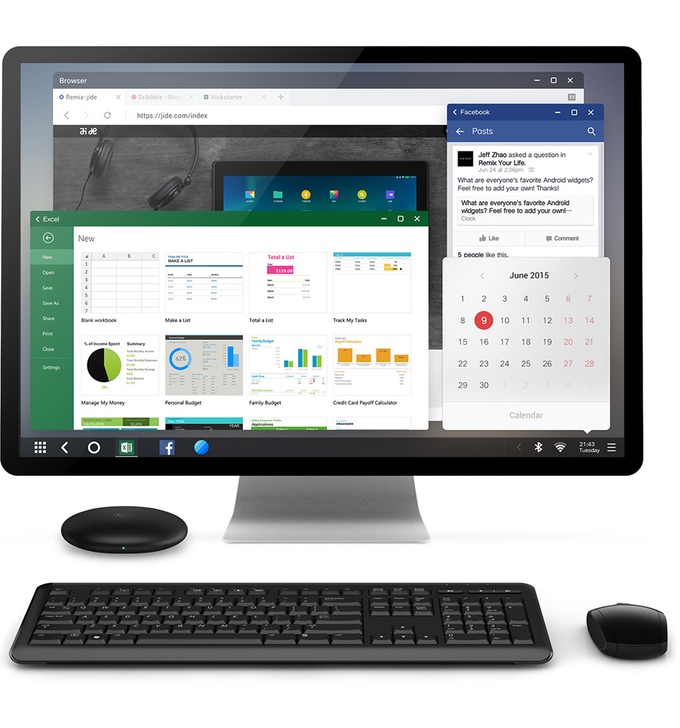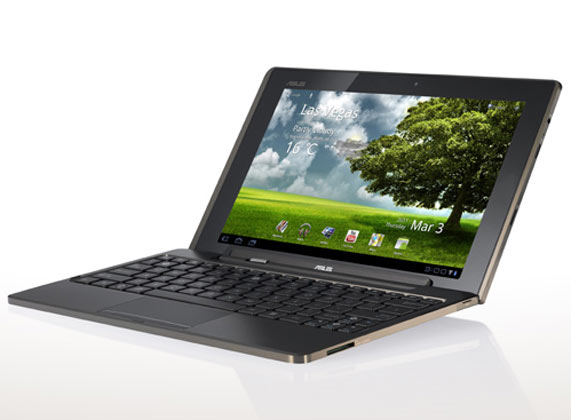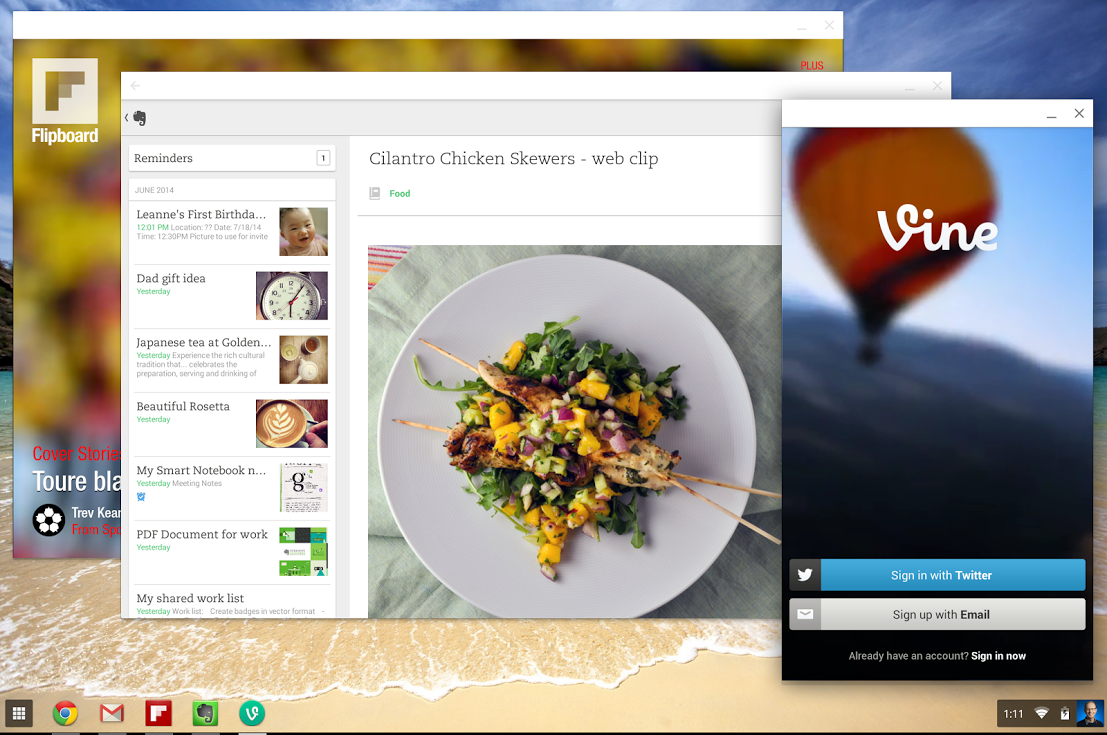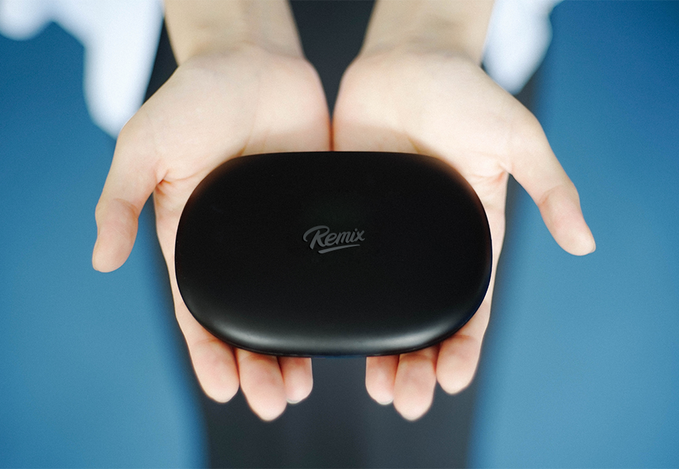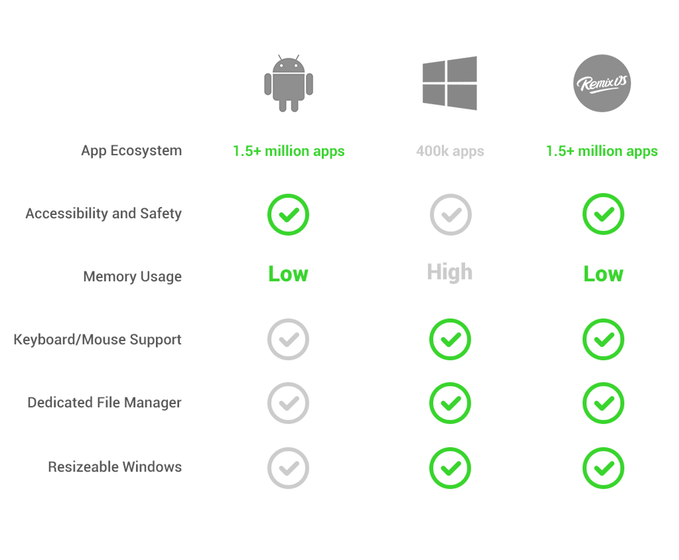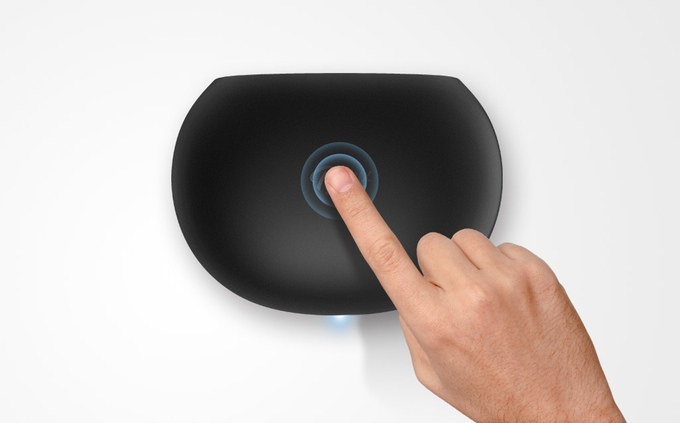Jide Tech Created The Beautiful, PC-Optimized Version Of Android That Google Wouldn't
A new Kickstarter-born startup by the name of Jide Tech launched a mini-PC that uses a beautiful custom version of Android, perfectly optimized for the PC form factor. The company seems to be years ahead of Google -- which hasn't shown great interest to build more PC-like features into Android so far.
Android On PCs
Android on PCs hasn't had much success, mainly because nobody has given it an honest try. Most of the attempts we've seen so far were at best slight modifications of the tablet interface (itself not that different from the phone interface) put on a much larger screen, while still working as if it were a tablet.
However, it's not the OEMs that should invest their money into making Android a success on PCs, but Google. Android is Google's most successful product yet, actively used by more than a billion users, and it's also the company's best chance to ever pose a serious threat to Windows on the desktop.
Google doesn't seem willing to engage in such a vision yet, though. Instead, it prefers to limp along in the market with Chromebooks; although they may keep growing in popularity, it doesn't seem to happen particularly fast. It could be a decade before Google reaches something like 20 percent market share, and that's probably an optimistic outlook for Chrome OS.
Adding some Android apps to Chromebooks is not going to change things that much. Google is trying to add Android apps to Chrome OS one by one. It's an OS where they don't feel quite like at home, and at this rate it's going to take forever to match the richness of the mobile Android's ecosystem of apps.
It would make much more sense to simply optimize a custom version of Android -- the way Google has already done for TVs, smartwatches, the auto industry, and even the IoT market -- for PCs, rather than try to integrate Android apps into a browser-based operating system.
Android is known by so many people, and it's much easier to see how they could want to upgrade to a more "full-blown" version of the operating system that allows them to be much more productive than on a phone.
Get Tom's Hardware's best news and in-depth reviews, straight to your inbox.
Being productive is key here. Although we're doing so many more things today on our phones than we did 10 years ago, smartphones still have their hard limitations, given their small screens and touch keyboards.
The reason the previous attempts to put Android on a PC have failed so far is because they weren't making users that much more productive than they were on their phones. Plus, the interface was completely inadequate for a desktop environment.
Remix Mini
While it's still not clear whether Google will even bring a multi-window system to Android M (the code seems to exist, but it hasn't been announced as a feature yet), Jide Tech launched a sub-$100 64-bit PC that runs a custom Lollipop-based version of Android, fully optimized for the desktop environment. Interestingly enough, the company is comprised of three former Google engineers.
Inside the Remix OS, as it is called, you can run multiple apps at the same time, be they spreadsheets, chat apps, browsers and whatever else you want, just as you would on a competing PC desktop OS. The best part is everything looks as it should. It has pretty material design aesthetics, supports multiple windows running at the same time (as a desktop OS should), and it even has a taskbar and a start button.
The lack of a start button has caused Microsoft great headaches since the launch of Windows 8, which showed how important it was for many users. It also wasn't until Chrome OS adopted a start button and a taskbar that it started to feel like it could actually become a real alternative to Windows or Mac OS X, for those who don't do much else than use the Internet on their PCs.
The advantage of an Android-based PC OS is that it can access over 1.5 million apps from day one, unlike Chrome OS, for which developers have to compile their apps one at a time.
Many Android apps won't look like they were designed for a desktop environment when run inside the Remix OS, but you can run tablet apps that go full screen, or phone apps that make just as much sense on the desktop as they do on a phone (as it is the case with chat applications, for instance).
The Remix Mini PC costs as little as $30 on Kickstarter, yet it still offers hardware powerful enough to run a more efficient mobile OS such as Android (compared to most desktop operating systems).
It comes with a quad-core 1.2 GHz 64-bit Cortex-A53 CPU from Allwinner, 1 GB of RAM, 8 GB of storage, and it supports 4k video decoding and 4k HDMI output. It also has a headphone minijack, an HDMI 1.4 port, two USB 2.0 ports, an Ethernet port, 80211 b/g/n Wi-Fi, and Bluetooth 4.0.
The whole system consumes less than 10W of power and can boot with a single tap on the top of the device.
The Remix Mini can be upgraded to 2 GB of RAM and 16 GB of storage for $40 (Early Bird) or $50 (Standard offer), depending which is still available by the time you check out Jide Tech's Kickstarter campaign page.
The campaign's goal was $50,000, and less than three days later it's already at $377,606, with 42 days to go. The more successful the $30 Remix Mini and the Remix OS become, the higher the chance that Google could eventually start taking the idea of a PC-optimized version of Android seriously itself and start working on it -- or perhaps even acquire the Jide Tech company for its head start and expertise.
Follow us @tomshardware, on Facebook and on Google+.
Lucian Armasu is a Contributing Writer for Tom's Hardware US. He covers software news and the issues surrounding privacy and security.
-
kenjitamura I'm hard pressed to think of a single desktop use Android would be better at than some other existing Linux OS that was built from the ground up with the desktop in mind.Reply -
blazorthon ReplyI'm hard pressed to think of a single desktop use Android would be better at than some other existing Linux OS that was built from the ground up with the desktop in mind.
It's not about being better than other Linux distributions, it's about the apps available to Android and the familiarity that most people already have with Android. Also keep in mind that most of those Linux distributions still occasionally need some command line tinkering for some things.
As a proof of concept, this looks like an excellent start to me. Give it USB 3.0 and I'd buy one. -
basroil 1) Looks like they just tried to copy Windows 10 UI straight upReply
2) Only 400k apps on Windows? Try >10 million, most without needing "app store" garbage either! (Steam is one such app store)
3) Android 4.4+ is not "low memory", when my phone starts up it's already using ~500mb, or about 25% of my phone's memory, while windows 7 on a similar spec computer is ~600 without disabling too much. -
jimbo007 Android as it is, is not suitable for as a desktop OS. The kernel and process scheduler among many other core components are optimized for a OS running on a battery with limited power supply and thermal envelope. Running a desktop OS driven with mouse/KB with true multi-tasking and running on AC power requires substantial changes to the OS core, essentially reverting back to its Linux origins! I don't know at what stage is this "Remix OS".Reply -
jimbo007 I think it would be more practical to add an Android sub-system to Windows and Linux.Reply -
blazorthon Reply16273857 said:Android as it is, is not suitable for as a desktop OS. The kernel and process scheduler among many other core components are optimized for a OS running on a battery with limited power supply and thermal envelope. Running a desktop OS driven with mouse/KB with true multi-tasking and running on AC power requires substantial changes to the OS core, essentially reverting back to its Linux origins! I don't know at what stage is this "Remix OS".
I don't understand what you mean by optimized for battery devices. Windows works fine both on a desktop and on a laptop with a battery, or even some tablets, so what are you really trying to say? You don't need to change Android's core to make it run on a desktop. You don't even really need to change much to make it work with a keyboard and mouse.
For one, keyboard stuff is already used and two, you just click the mouse where you would have tapped with your fingers. Things like zooming in by spreading fingers on the screen might need to be changed, but there should be less need for zooming anyway with the more full-sized display and that's still easy to implement with minimal changes.
No computer actually runs on AC power. They all have power adapters to convert to proper DV voltages for components such as 12V, 5V, and 3.3V. Furthermore, the OS doesn't care what kind of power is being used. The OS has literally no impact on this.
Android already supports true multitasking. -
kenjitamura Reply2) Only 400k apps on Windows? Try >10 million, most without needing "app store" garbage either! (Steam is one such app store)
They're probably referencing the number of apps for Windows RT which is Windows for ARM processors. I assume this to be the case because the device they're marketing uses an ARM processor.
-
jimbo007 ReplyI don't understand what you mean by optimized for battery devices. Windows works fine both on a desktop and on a laptop with a battery, or even some tablets, so what are you really trying to say? You don't need to change Android's core to make it run on a desktop. You don't even really need to change much to make it work with a keyboard and mouse.
For one, keyboard stuff is already used and two, you just click the mouse where you would have tapped with your fingers. Things like zooming in by spreading fingers on the screen might need to be changed, but there should be less need for zooming anyway with the more full-sized display and that's still easy to implement with minimal changes.
No computer actually runs on AC power. They all have power adapters to convert to proper DV voltages for components such as 12V, 5V, and 3.3V. Furthermore, the OS doesn't care what kind of power is being used. The OS has literally no impact on this.
Android already supports true multitasking.16273857 said:Android as it is, is not suitable for as a desktop OS. The kernel and process scheduler among many other core components are optimized for a OS running on a battery with limited power supply and thermal envelope. Running a desktop OS driven with mouse/KB with true multi-tasking and running on AC power requires substantial changes to the OS core, essentially reverting back to its Linux origins! I don't know at what stage is this "Remix OS".
I don't understand what you mean by optimized for battery devices. Windows works fine both on a desktop and on a laptop with a battery, or even some tablets, so what are you really trying to say? You don't need to change Android's core to make it run on a desktop. You don't even really need to change much to make it work with a keyboard and mouse.
For one, keyboard stuff is already used and two, you just click the mouse where you would have tapped with your fingers. Things like zooming in by spreading fingers on the screen might need to be changed, but there should be less need for zooming anyway with the more full-sized display and that's still easy to implement with minimal changes.
No computer actually runs on AC power. They all have power adapters to convert to proper DV voltages for components such as 12V, 5V, and 3.3V. Furthermore, the OS doesn't care what kind of power is being used. The OS has literally no impact on this.
Android already supports true multitasking.
1. AC-powered vs battery-powered means access to unlimited power source. That is the OS kernel does not suspend background processes or kill idle ones. It means there is no significant difference at the kernel-level between the foreground and background processes and the scheduler support true multi-tasking. Also the memory manager's working algorithm would change significantly. It would require undoing many of the changes Google made to the Linux kernel in the first place and would be pointless. It's just easier to add an Android subsystem to Linux. There is a reason Google has not shown any interest in "Android on PC".
2. Simply supporting a mouse requires significant changes to the OS and the programming model (message-driven programming, pointer tracing, etc.).
3. Any high-school boy would know the hardware components don't run on the AC power themselves. It means an unlimited power source. Just go back to my first point.
4. With respect, please take a course on OS basics before wasting other people's time.
